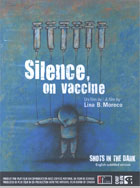
Silence, on Vaccine: Shots in the Dark 2009
Distributed by National Film Board of Canada, 1123 Broadway, Suite 307, New York, NY 10010; 800-542-2164
Produced by Play Film in cooperation with the National Film Board of Canada
Directed by Lina B. Moreco
DVD, color, 87 min.
Sr. High - Adult
Bioethics, Child Development, Health Sciences, Law, Learning Disabilities, Nursing
Date Entered: 04/08/2010
Reviewed by Jane Scott, Public Services Librarian, George Fox UniversitySilence, on Vaccine: Shots in the Dark, is a snapshot of the current controversy surrounding vaccination. Although, controversy over vaccinations is not new, current childhood immunization schedules include twice the amount of vaccines compared to 25 years ago, with multiple vaccines given simultaneously being the norm. In addition, elements used in the preparation of vaccines such as mercury and aluminum have not been tested for safety in humans since the early 1920’s. These facts, along with the increase in diagnosed cases of autism spectrum disorders and learning disabilities, coupled with the striking similarity in parental and physician post vaccination observations, direct the film’s exploration of the contention between government agencies, legal authorities, watch dog associations, drug companies, physicians, parents, and children.
Moreco, an award winning film maker, succeeds in making a good case for public alarm and the need for impartial scientific studies to establish evidence based vaccination schedules, vaccine safety, and making compensation accessible. Parents put a human face on the facts as they relate their stories. Several recount how they watched their children “just go away” within hours or days of receiving the MMR vaccine. Adults impart their stories of vaccine harm as well from Meningitis and Hepatitis A and B vaccines. Interspersed with these personal stories are interviews with biochemists, researchers, and physicians from their labs in France, England, Canada, and the United States. In turn, they explain the range of possible individual body and brain immune responses to vaccine.
Governments in Canada, France, and the United States have funds set aside for those adversely affected by vaccination. The potential for adverse reactions, again, is not new information. Conversely, as interviewed lawyers attest, science has not established clear causal evidence for the many biological processes by which individual immune systems and neurobiological processes can be damaged by vaccine. Therefore, this makes compensation difficult to obtain and an additional legal and emotional burden for the family.
Watch dog agencies in France, the United States, England, and Canada as well as the United States House Committee on Government Reform testified as to how and why they continue to sound the alarm. The demands of public health agencies in free societies are called into question when there are not scientific studies of confirmation. Rather than “shooting in the dark”, these groups contend that objective studies need to be done.
The cinematography and technical quality of this film are excellent. The splicing of personal narrative with interviews from government, scientific, and watch dog communities works well in investigating the many perspectives of the problem and keeping the audience engaged. Interviews from the pharmaceutical industry as well as scientists and physicians who do not object to the status quo would have been helpful. Their absence detracts from the strong evidence presented.
This documentary would be useful for classes on public policy, public health, ethics, or the health sciences. It would also prove useful for freshman writing/research classes in which students must dissect arguments and evaluate evidence.
The film’s website includes additional information along with the author’s statement.
Awards
- Director, Lina B. Moreco‘s documentary, Medicine Under the Influence, was the 2007 winner of the Academy of Canadian Cinema and Television’s Gemini Award for Best Documentary in the category of Nature & Sciences.